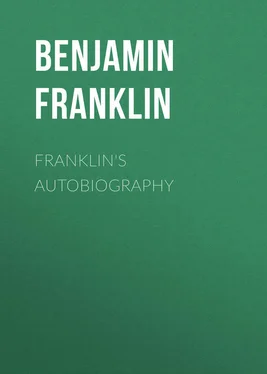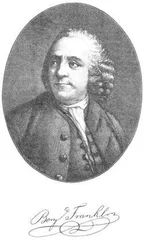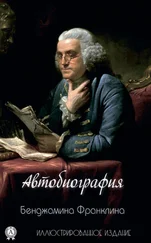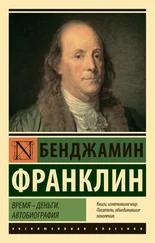Бенджамин Франклин - Franklin's Autobiography
Здесь есть возможность читать онлайн «Бенджамин Франклин - Franklin's Autobiography» — ознакомительный отрывок электронной книги совершенно бесплатно, а после прочтения отрывка купить полную версию. В некоторых случаях можно слушать аудио, скачать через торрент в формате fb2 и присутствует краткое содержание. Издательство: Иностранный паблик, Жанр: История, foreign_antique, foreign_prose, на английском языке. Описание произведения, (предисловие) а так же отзывы посетителей доступны на портале библиотеки ЛибКат.
- Название:Franklin's Autobiography
- Автор:
- Издательство:Иностранный паблик
- Жанр:
- Год:неизвестен
- ISBN:нет данных
- Рейтинг книги:3 / 5. Голосов: 1
-
Избранное:Добавить в избранное
- Отзывы:
-
Ваша оценка:
- 60
- 1
- 2
- 3
- 4
- 5
Franklin's Autobiography: краткое содержание, описание и аннотация
Предлагаем к чтению аннотацию, описание, краткое содержание или предисловие (зависит от того, что написал сам автор книги «Franklin's Autobiography»). Если вы не нашли необходимую информацию о книге — напишите в комментариях, мы постараемся отыскать её.
Franklin's Autobiography — читать онлайн ознакомительный отрывок
Ниже представлен текст книги, разбитый по страницам. Система сохранения места последней прочитанной страницы, позволяет с удобством читать онлайн бесплатно книгу «Franklin's Autobiography», без необходимости каждый раз заново искать на чём Вы остановились. Поставьте закладку, и сможете в любой момент перейти на страницу, на которой закончили чтение.
Интервал:
Закладка:
"But the fighting face we put on and the reasoning we used with the insurgents … having turned them back and restored quiet to the city, I became a less man than ever; for I had by this transaction made myself many enemies among the populace; and the governor, … thinking it a favorable opportunity, joined the whole weight of the proprietary interest to get me out of the Assembly; which was accordingly effected at the last election by a majority of about twenty-five in four thousand voters. The House, however, when they met in October, approved of the resolutions taken, while I was Speaker, of petitioning the Crown for a change of government, and requested me to return to England to prosecute that petition; which service I accordingly undertook, and embarked at the beginning of November last, being accompanied to the ship, sixteen miles, by a cavalcade of three hundred of my friends, who filled our sails with their good wishes, and I arrived in thirty days at London."
Instead of giving his efforts to the proposed change of government Franklin found greater duties. The debt which England had incurred during the war with the French in Canada she now looked to the colonists for aid in removing. At home taxes were levied by every device. The whole country was in distress and laborers starving. In the colonies there was the thrift that comes from narrowest means; but the people refused to answer parliamentary levies and claimed that they would lay their own taxes through their own legislatures. They resisted so successfully the enforcement of the Stamp Act that Parliament began to discuss its repeal. At this juncture Franklin was examined before the Commons in regard to the results of the act.
Q. Do you not think the people of America would submit to pay the stamp duty if it was moderated?
A. No, never, unless compelled by force of arms…
Q. What was the temper of America toward Great Britain before the year 1763? 3 3 When the old duties "upon all rum, spirits, molasses, syrups, sugar," etc., were renewed, and extended to other articles.
A. The best in the world. They submitted willingly to the government of the Crown, and paid, in their courts, obedience to the acts of Parliament. Numerous as the people are in the several old provinces, they cost you nothing in forts, citadels, garrisons, or armies, to keep them in subjection. They were governed by this country at the expense only of a little pen, ink, and paper; they were led by a thread. They had not only a respect but an affection for Great Britain, for its laws, its customs and manners, and even a fondness for its fashions that greatly increased the commerce. Natives of Britain were always treated with particular regard; to be an "Old England man" was, of itself, a character of some respect, and gave a kind of rank among us.
Q. And what is their temper now?
A. Oh, very much altered…
Q. If the Stamp Act should be repealed, would it induce the assemblies of America to acknowledge the right of Parliament to tax them, and would they erase their resolutions?
A. No, never.
Q. Are there no means of obliging them to erase those resolutions?
A. None that I know of; they will never do it unless compelled by force of arms.
Q. Is there a power on earth that can force them to erase them?
A. No power, how great soever, can force men to change their opinions…
Q. What used to be the pride of the Americans?
A. To indulge in the fashions and manufactures of Great Britain.
Q. What is now their pride?
A. To wear their old clothes over again, till they can make new ones.
After the repeal of the act, Franklin wrote to his wife: "I am willing you should have a new gown, which you may suppose I did not send sooner as I knew you would not like to be finer than your neighbors unless in a gown of your own spinning. Had the trade between the two countries totally ceased, it was a comfort to me to recollect that I had once been clothed from head to foot in woolen and linen of my wife's manufacture, that I never was prouder of any dress in my life, and that she and her daughter might do it again if it was necessary."
Franklin stayed ten years in England. In 1774 he presented to the king the petition of the first Continental Congress, in which the petitioners, who protested their loyalty to Great Britain, claimed the right of taxing themselves. But, finding this and other efforts at adjustment of little avail, he returned to Philadelphia in May, 1775. On the 5th of July he wrote to Mr. Strahan, an old friend in London: "You are a member of Parliament, and one of that majority which has doomed my country to destruction. You have begun to burn our towns and murder our people. Look upon your hands; they are stained with the blood of your relations! You and I were long friends; you are now my enemy, and I am yours."
After the Declaration of Independence and the establishment of the States as a nation, Franklin was chosen as representative to France. "I am old and good for nothing," he said, when told of the choice, "but, as the storekeepers say of their remnants of cloth, I am but a fag-end; you may have me for what you please."
It was a most important post. France was the ancient enemy of England, and the contingent of men and aid of money which Franklin gained served to the successful issue of the Revolution. He lived while in France at Passy, near Paris, from which he wrote to a friend in England: "You are too early … in calling me rebel; you should wait for the event which will determine whether it is a rebellion or only a revolution… I know you wish you could see me; but, as you cannot, I will describe myself to you. Figure me in your mind as jolly as formerly, and as strong and hearty, only a few years older; very plainly dressed, wearing my thin, gray, straight hair, that peeps out under my only coiffure, a fine fur cap which comes down my forehead almost to my spectacles. Think how this must appear among the powdered heads of Paris! I wish every lady and gentleman in France would only be so obliging as to follow my fashion, comb their own heads as I do mine, dismiss their friseurs, and pay me half the money they pay to them."
At last, in 1785, he came home, old and broken in health. He was chosen president, or governor, of Pennsylvania, and the faith of the people in his wisdom made him delegate to the convention which framed the Constitution in 1787. He died in 1790, and was buried by his wife in the graveyard of Christ Church, Philadelphia.
The epitaph which he had written when a printer was not put upon his tomb:
§ 1. PARENTAGE AND BOYHOOD
4 4 A village near Winchester, Hampshire, England, where Dr. Jonathan Shipley had his country house. Dr. Shipley was Bishop of St. Asaph's in Wales, and Franklin's friend.at the Bishop of St. Asaph's, 1771 .
Dear Son: 5 5 Franklin's only living son, William, who in 1762 had been made royal governor of New Jersey, with the hope of detaching Franklin from the cause of the colonists.
I have ever had pleasure in obtaining any little anecdotes of my ancestors. You may remember the inquiries I made among the remains of my relations when you were with me in England, and the journey I undertook for that purpose. Imagining it may be equally agreeable to you to know the circumstances of my life, many of which you are yet unacquainted with, and expecting the enjoyment of a week's uninterrupted leisure in my present country retirement, I sit down to write them for you. To which I have besides some other inducements. Having emerged from the poverty and obscurity in which I was born and bred, to a state of affluence and some degree of reputation in the world, and having gone so far through life with a considerable share of felicity, the conducing means I made use of, which with the blessing of God so well succeeded, my posterity may like to know, as they may find some of them suitable to their own situations, and therefore fit to be imitated.
Интервал:
Закладка:
Похожие книги на «Franklin's Autobiography»
Представляем Вашему вниманию похожие книги на «Franklin's Autobiography» списком для выбора. Мы отобрали схожую по названию и смыслу литературу в надежде предоставить читателям больше вариантов отыскать новые, интересные, ещё непрочитанные произведения.
Обсуждение, отзывы о книге «Franklin's Autobiography» и просто собственные мнения читателей. Оставьте ваши комментарии, напишите, что Вы думаете о произведении, его смысле или главных героях. Укажите что конкретно понравилось, а что нет, и почему Вы так считаете.





![Бенджамин Франклин - Время – деньги. Автобиография [litres]](/books/397995/bendzhamin-franklin-vremya-dengi-avtobiografiya-thumb.webp)




